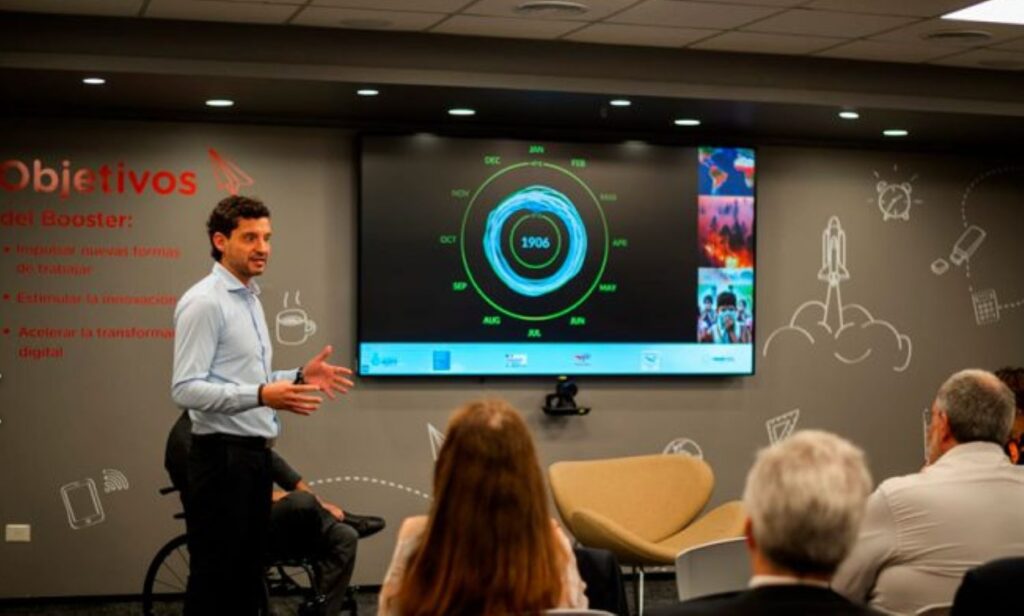AI-powered sensors for air quality monitoring: a significant advance in environmental health

Un expositor presenta ante un grupo de personas en una sala de conferencias, utilizando gráficos visuales para abordar temas relacionados con la innovación, el cambio climático y los objetivos de transformación digital.
Air quality is one of the major environmental challenges in many regions around the world. In Argentina, a team of researchers from Conicet, led by Dr. Rodrigo Gibilisco, has developed an innovative network of artificial intelligence-based sensors that not only measures atmospheric pollution but also helps detect fire outbreaks and provides key tools for public policy development. This network, known as Breathe2Change, promises to transform environmental monitoring and health protection in Argentina and beyond.
In 2021, Breathe2Change began in the province of Tucumán, where the first sensors were installed to monitor air quality in real time. The project focuses on measuring pollutant microparticles that originate from various sources such as industry, vehicles, agriculture, and fires. The system provides accurate data on the concentration of fine particles, which can be up to 100 times smaller than the diameter of a human hair—making them especially dangerous to respiratory health.
Dr. Gibilisco and his team have successfully integrated artificial intelligence into these sensors, allowing them to improve in accuracy over time. Through machine learning, the sensors “learn” to better identify air pollutants, increasing the system’s overall effectiveness. The collected data is sent to the cloud, where it can be processed, analyzed, and used to generate pollution maps and early alerts for the public.
This project, which began with a network of more than 20 sensors in Tucumán, is now expanding to ten Argentine provinces. The long-term vision of Breathe2Change is to build a federal network for air quality monitoring, enabling comprehensive tracking of pollution across the country to improve public health and support global sustainability efforts.
Global impact and international support
The Breathe2Change project has received international recognition for its innovation and effectiveness. In 2021, the Alexander von Humboldt Foundation awarded the team for their work in Tucumán, and more recently, the Energy Policy Institute at the University of Chicago (EPIC) provided a grant to expand the network into more provinces. This international backing highlights the importance of Gibilisco’s work and its capacity to deliver high-quality, real-time environmental data.
The project’s ability to generate open-source air pollution data places Argentina on par with similar initiatives in the European Union, demonstrating its global impact. The information gathered will not only help local authorities make informed public health decisions but also contribute to more effective energy and environmental policies aligned with global sustainability goals.
Artificial intelligence in the service of public health
Artificial intelligence not only enhances the precision of the sensors but also plays a fundamental role in data analysis. With advanced algorithms, researchers can identify pollution patterns, analyze their geographical distribution, and correlate pollution levels with the prevalence of respiratory and cardiovascular diseases in affected populations. These advances allow health authorities to implement preventive and corrective measures more effectively.
In addition, Gibilisco leads another complementary project called DALI-Sense, which uses the sensor network to detect pollutants associated with wildfires. By combining this data with satellite information and other variables, the team aims to develop an early fire warning platform that enables authorities to respond quickly and minimize damage to life and property. This multidimensional approach makes the sensor network a key tool not only in public health but also in natural disaster management.
The development of the Breathe2Change sensor network, supported by artificial intelligence, marks a milestone in environmental monitoring in Argentina. This project not only offers an innovative platform for measuring air quality but also has a significant impact on public health. With the support of national and international institutions, the project has crossed borders, positioning itself as a global benchmark in sustainability and environmental protection.
As the network expands to more provinces, the benefits for both public health and the environment will continue to grow. Initiatives like this demonstrate that collaboration between the public sector, private companies, and academia is crucial to addressing environmental challenges and improving quality of life. Breathe2Change is not just a technological advancement—it is clear evidence of how science and technology can contribute to a healthier future for all.








